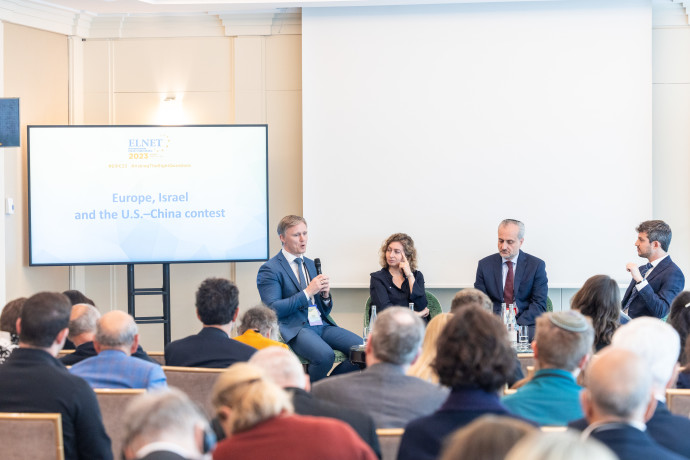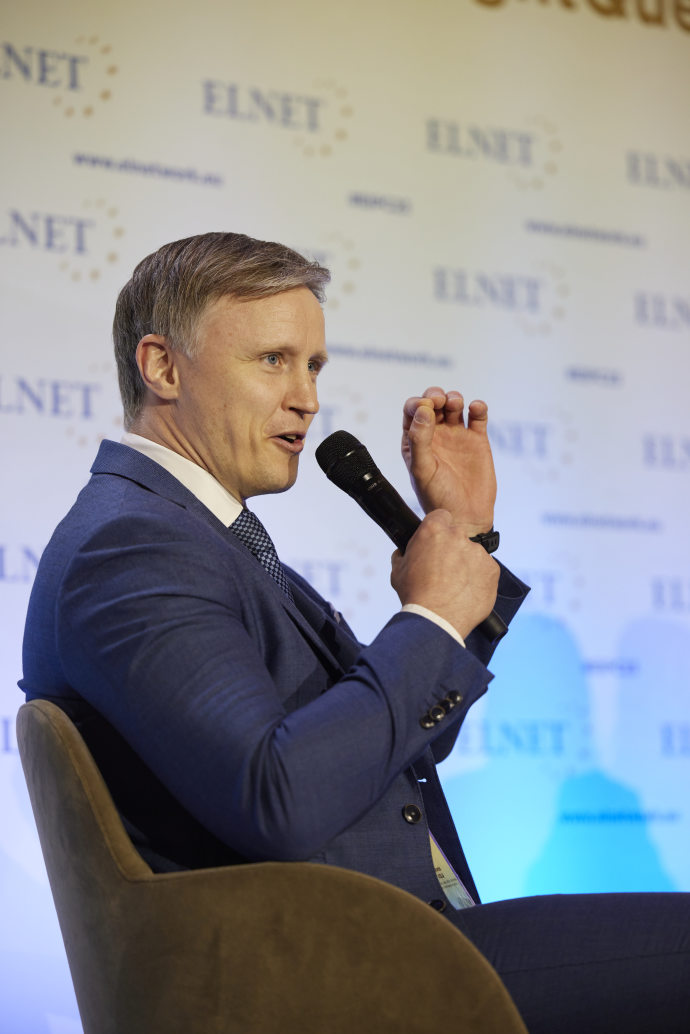Paris was the site of the European Leadership Network’s third International Policy Conference (EIPC 2023), held on May 8-10. It attracted some 500 participants, including influential policymakers and leading public opinion makers from over a dozen countries in Europe and the Arab world, as well as Israel and the US. They gathered to discuss and impact the shaping of Europe’s Middle East policy and Europe-Israel relations. ELNET, established in 2010, is a nonprofit, bipartisan organization dedicated to strengthening ties between Europe and Israel, based on shared democratic values and strategic interests, with the goal of bringing Europe closer to Israel.
The organization facilitates relationships between policymakers in Israel and their European counterparts by bringing European officials and policy influencers to Israel to see the country firsthand and meet with their Israeli colleagues. While ELNET occasionally brings Israeli politicians to Europe, the majority of delegations are in the direction of Israel from Europe.

ELNET also organizes and facilitates high-level strategic dialogues between Europe and Israel, focusing on the major geopolitical issues facing both parties and on Israeli-European relations.
The theme of this year’s conference – the first face-to-face event since COVID – was “A New Era in Europe-Israel Relations.” Policy areas such as new security challenges, the war in Ukraine and its aftermath, Israeli-Arab normalization, the Russian and Iranian threats, energy and food security, climate change, antisemitism and anti-Zionism were all discussed during the sessions.
Rihards Kols, a member of the Latvian Parliament and Chair of its Foreign Affairs Committee, attended the conference as a speaker on various panels. He shared his reaction to the event with the Magazine. Kols has been involved with the ELNET community for several years and has visited Israel twice on ELNET study tours. “I received a great deal of exposure about the Middle East at the conference, regarding its dynamics, challenges and opportunities,” said Kols, who noted that the presence of leaders from Arab countries provided a different perspective on events in the region, especially regarding the Abraham Accords, which are not widely known in Latvia and the Baltic countries.

Kols expressed his appreciation for Israeli assistance to Ukraine and said that Israel should play an important role in helping the country. “I know that Israel is developing an early warning system for Ukraine that is crucial for air defense,” he said.
European Countries, and Latvia in particular, can learn a great deal from Israel’s experience in security, defense and civil defense. Kols warned that countries that do not take their defense needs seriously risk the danger of being harmed by more aggressive nations. In light of NATO’s upcoming 75th anniversary, Kols said Israel should be invited to become a global partner of NATO, adding that “it is time for the democratic world to unite. If we look at the member states of the United Nations, democracies are in the minority. If Australia, New Zealand, Korea and Japan are already global partners to NATO, it makes sense for Israel to also be a global partner, and the cooperation should be enhanced.”
A number of sessions at the conference focused on the dangers that the Iranian nuclear threat presents to the world, and Kols said that participants did not provide a clear-cut answer to the issue. “Some said diplomacy can prevail,” he said, “using an enhanced version of the Joint Comprehensive Plan of Action (JCPOA) signed in 2015. Others said it was a waste of time, since the very existence of the Iranian regime depends on its production of nuclear weapons.” He added that the discussions of Russian aggression in Ukraine – and how it affects policies in the Middle East – were useful. The Latvian Foreign Affairs Committee, which Kols heads, has adopted a resolution expressing solidarity with the people of Iran, reflecting the protests in recent months, Iranian human rights violations, and ongoing executions.
Kols drew a comparison between Latvia and Israel regarding the threats posed by its neighbors. Latvia regards Russia, especially since its invasion of Ukraine, as an existential threat to its sovereignty and freedom, he said, just as Israel is wary of Iran. “This makes Latvia and Israel natural, like-minded countries,” he said. Israel’s experience of being exposed to hostile environments since its establishment is something that European countries can learn from and is a potential area of cooperation – not only for Latvia but for the Baltic countries as a whole.
Beyond the energy and defense sectors, Kols said there are numerous areas of cooperative opportunities for Israel and European nations, such as culture, education, energy, science and technology. In addition, he expressed the hope that Europe and Israel can work together to maintain the rules-based international order created after World War II, meaning, in his words, “the international institutions and international agreements” that have been targeted by Russia and other countries. “For many small European countries, this is paramount.”
Latvia and Israel established diplomatic relations over 30 years ago, in 1992, after the Baltic country won its independence from the former Soviet Union. Latvia, which has a population of close to two million people, is located on the Baltic Sea between Lithuania and Estonia.
Chuckling, Kols pointed out that Israel, due to its influence in the region, is perceived as being far larger than it actually is. In Latvia, he noted, people say that Israel should invest in Europe and his country. “Then we look at the size of Israel and the population. There is a perception that Israel is a very large country – perhaps almost half the size of the United States. Israel has a huge influence in the region.” Israeli politicians, he said, would be wise not to waste this perception that foreign leaders often have.
Another essential discussion topic at the conference was how Israel could use energy to build bridges with Europe through the Abraham Accords. ELNET is planning a strategic dialogue session in the coming months on the Abraham Accords, where the concept of developing shared energy solutions among Europe, Israel and Abraham Accord countries for North Africa, Europe and the Middle East will be discussed. By sharing know-how, investment and technical knowledge, different regions of the world can be stabilized. Kols added that Latvia is interested in investing in renewable energy and is open to Israeli investment in this area.
During the conference, ELNET presented its second pan-European Israel Survey which gathered the perspectives of parliamentarians across Europe on their respective relations with Israel and their Middle East policies, as well as their insights into Jewish life in Europe. The survey was conducted between February and March of 2023 by ELNET, during which 381 parliamentarians from 17 European parliaments, including the European Parliament, participated.
The survey revealed that a majority of participating MPs (66 %) consider their country’s relations with Israel to be either very good or rather good. Historical responsibility toward Israel serves as the basis for these special relations for most politicians, while shared values and interests also play a significant role. A substantial majority of European parliamentarians (77%) are calling for greater cooperation with Israel, focusing mainly on science and education, defense, homeland security, innovation issues, health, and climate change. Additionally, 76% believe that their countries should assume more responsibility within the framework of the Abraham Accords.
These numbers, along with ELNET’s successful Paris conference, indicate that the organization is succeeding in its mission to bring Europe closer to Israel in these complicated times.
This article was written in cooperation with ELNET.
